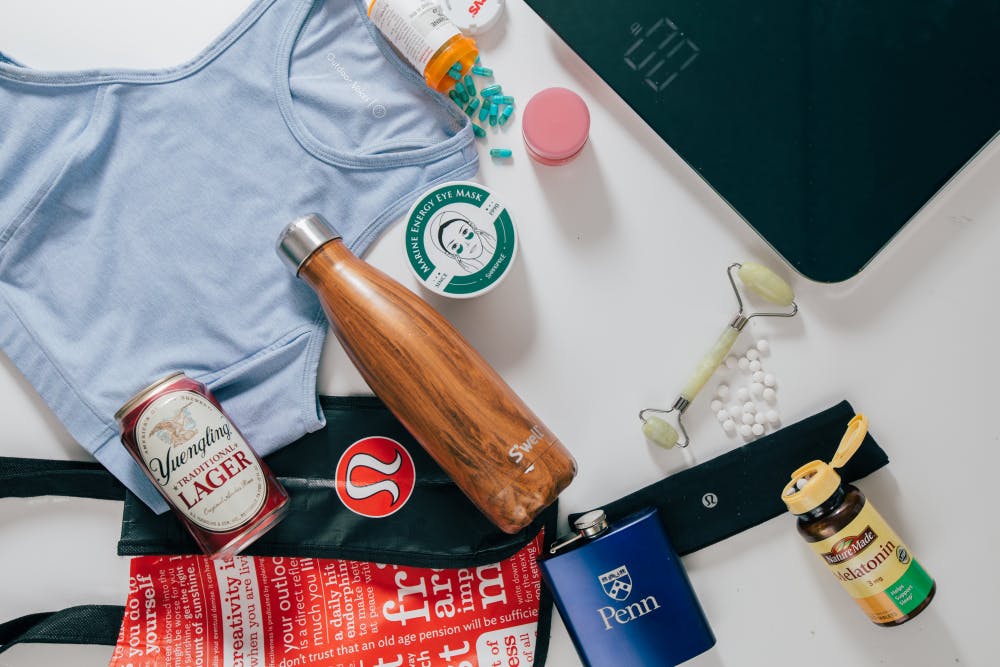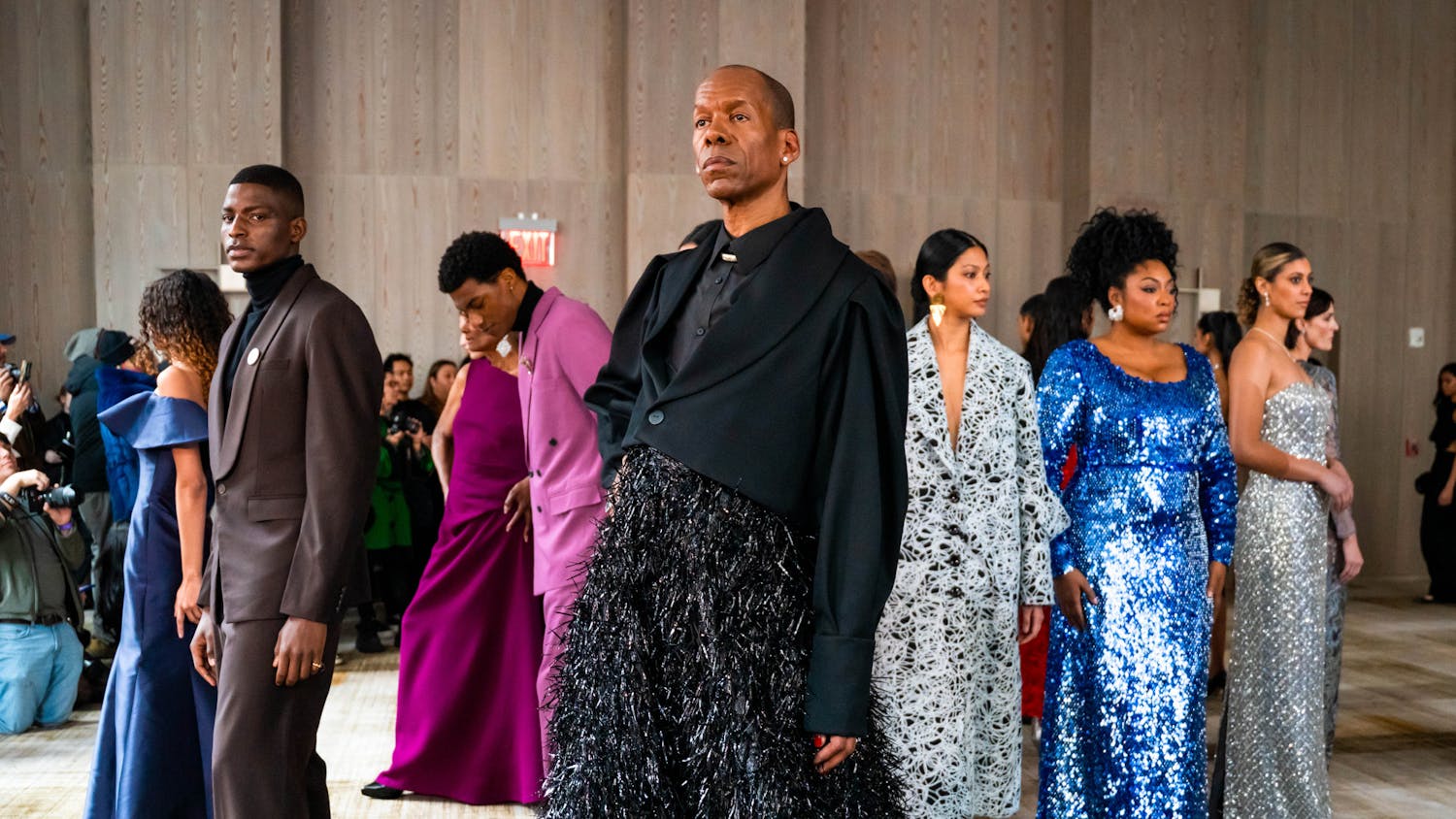At Penn, the pressure to be healthy—or at least look it—is palpable. On a typical weekday evening at Pottruck, it’s difficult to find an unoccupied elliptical. Fitbits and “athleisure” clothing, from Lululemon to Athleta, can always be spotted on Locust Walk. During lunchtime, the line of Penn students at sweetgreen goes out the door, while just a few steps away, Bobby’s Burger Palace is a ghost town.
Even though Sauda Salim (C ’23) is only a freshman, she’s already felt the pressure to project an image of being health–conscious. “When you go to the dining hall, and everyone else is eating salads and you’re eating pancakes with Hershey’s sauce, that’s pressuring you.”
While Janneke Evans (C ’22) is focused on being the best varsity rower she can be, she still senses this pressure. “People do definitely feel like, ‘oh you need to be fit.’”
At the same time, both Sauda and Zubaida Qaissi (C ’20) found unhealthy sleep habits to be one of the most shocking elements of Penn’s culture when they first arrived to campus. Already, according to Sauda, the Hill study lounges are packed with students still studying at 3 a.m. During her freshman year, Zubaida says, “I didn’t even question [how] everybody stays up to do their assignments, nobody has a normal sleep schedule, people skip class because they’re sleeping in. I absorbed it right away, just from how other people were acting,” she says, assuming that this was just the normal college experience. Throughout her time at Penn, Zubaida would pull all–nighters at least once a week, and felt almost delirious on a daily basis. “Once you pull an all–nighter, you’ve messed up your sleep schedule,” she says, noting that it unleashes a vicious cycle that makes it impossible to sleep normally.
Oftentimes, health and morality become intertwined—everyone has probably heard someone apologize for being "bad" after eating a dessert. In the same way that people assert their own morality through virtue signaling, people often take part in specific, socially approved behaviors that signal health. At Penn, this may take the form of $10 salad bowls or the pressure to go to Pottruck every night.

At the same time, though, this pressure starkly contrasts with other behaviors at Penn that some students have witnessed—unhealthy sleep schedules, drug abuse, overworking, and binge drinking. And just because you “health signal” doesn’t mean you’re exempt from participating in these behaviors. This is because of the long–standing divide between how society views the mind and body separately, and what Penn values.
“The Penn community often says we value health, but we especially value some health behaviors, and maybe don’t worry about somebody who’s overworking themselves, somebody who’s not sleeping,” says Dr. Ramah McKay, an assistant professor of History and Sociology of Science. “And part of it is that it’s easier to signal health that aligns with other dominant cultural values. You get to pat yourself on the back morally, while still meeting these dominant cultural ideas.”
The pressure to signal health reflects the world at large, according to McKay. “I think some of the signaling around health is a genuine attempt towards self–care, but a context where actually meaningful self–care is often quite difficult,” she says. Even though the health of one person may seem disconnected from wider society, McKay says, health has become a way to reinforce cultural values.
Besides sleep, Zubaida finds that Penn’s culture normalizes various unhealthy behaviors. “I’m not against alcohol in any way, but I found many people being like ‘Oh, I can’t wait to get blackout [drunk] tonight,’” she says, which seems normal only at a place like Penn.

This past spring, registered dietician and Penn Nursing professor Monique Dowd supervised students who conducted an anonymous health habits survey among nursing students. The finding she found most surprising was how many students took unprescribed and medically unnecessary medications such as Adderall.
Students say that Penn’s culture also values things that aren’t proof of wellness, such as thinness, which causes needless distress. For Zubaida, this affected her ability to work out. “I used to have a lot of anxiety about going to the gym, about people judging me for going to the gym, and not being thin. It used to occupy my mind so much that I couldn’t go to the gym sometimes.”
Many agree that Penn makes avoiding unhealthy behaviors like these difficult, though there are disagreements as to who is at fault. In particular, Sauda blames the student body for creating a culture where in the middle of academic and social commitments, “going to CAPS is the least of your priorities.” While Zubaida acknowledges that Penn plays a part, she feels the pressure comes from all of society. “People want to be healthy, appearing to be active, and I do think there’s an element of kind of fitting into the image of a perfect student,” she says.
At Penn, many of the ways people signal wellness are quite expensive. While a Pottruck membership comes with tuition, popular boutique exercise classes like SoulCycle or Orangetheory can cost hundreds of dollars a month. The rise of boutique exercise classes is a good example of how health has become increasingly commodified, where “being healthy is not only about your own relationship to your own body, but being able to achieve and perform these quite expensive markers of being healthy,” says McKay. Some scholars argue that these are ways individuals signal wealth in a world where passable knockoff luxury goods are commonplace, but healthy options like fresh produce are costly rarities.
Penn students, particularly those who do not come from wealth, are faced with unreasonable expectations because of the commodification of health. “The way Penn seems to work, it can become difficult to step out of such thinking, and so it becomes much easier to participate in, and thus maintaining [and/or] upholding this type of ‘culture,’” Zubaida says. She continues, “I think it probably makes the inequality many experience here more invisible in the dominant ways people perceive the campus environment. This in turn can make some people who do not participate, whether out of their own choice or not, stand out in some ways.”
When Janneke, who swears by Sakara, an organic meal delivery service, learned that the FDA doesn’t regulate the classification of food items as “organic,” she was shocked. It’s easy to assume that products marketed as organic are healthy by default. But in fact, the use of the word “organic” on food labels may not always be as reliable as customers assume. “Unless it says 100% organic, if it just says organic, it’s not necessarily 100% organic,” Dowd qualifies. There are debates about whether organic foods are actually healthier than their non–organic counterparts, though informally, organic food is typically viewed as inherently better. Dowd also points out that natural and synthetic pesticides are often composed of the same chemicals. “I’m not quite sure that organic is any healthier than using synthetic pesticides,” she says.

These commodified health trends have a global reach, too, thanks to social media. Coming from Kenya, Sauda had learned about trends such as athleisure, Keto, detoxes, and weight loss teas, from Instagram before ever stepping foot in America this summer.
Health trends can also be harmful because most of the messaging surrounding them is purely individualistic. Fitness slogans like Nike’s iconic "Just Do It" imply the only obstacle to wellness is willpower. But the largest influences on health outcomes are environment and socioeconomic status—the social determinants of health. Much of this is informed by systematic oppression—a recent analysis in Chicago found that residents of a wealthy, white neighborhood lived, on average, 30 years longer than residents of a poor, black neighborhood nearby.
Of course, some students have found themselves exposed to positive health behaviors upon coming to Penn. In Kenya, Sauda had never filled out a depression screening survey. “No one cares about such things in Kenya, unless you go specifically for that,” she says.

Even though she had gone into SHS with a common cold, the depression screening survey responses warranted a CAPS referral. “It was nice, very efficient,” she says of her first SHS visit, and her first medical appointment in America. “It’s good that people are like going all hard on mental health, making people come out and talk to mental health professionals.”
Ultimately, many students find that health should be an individual journey. For instance, Zubaida feels pretty much over her fear of going to the gym. Eventually she realized that, “in reality, the most likely scenario is that nobody is looking at you. Nobody cares about what you’re doing. People are going to do their business and leave. And that’s what I’m doing too.”
But Zubaida’s primary health goal is committing to a normal sleep schedule. Before, she’d pull an all–nighter at least once a week. She says she didn’t have a sleep schedule at all. Beyond sleeping 7–9 hours each night, for her, this new commitment means, “letting go of this constant anxiety that I’m not doing enough.”
Katrina Janco is a third–semester senior studying Communication from Audubon, NJ. She is a Features Writer for Street.





